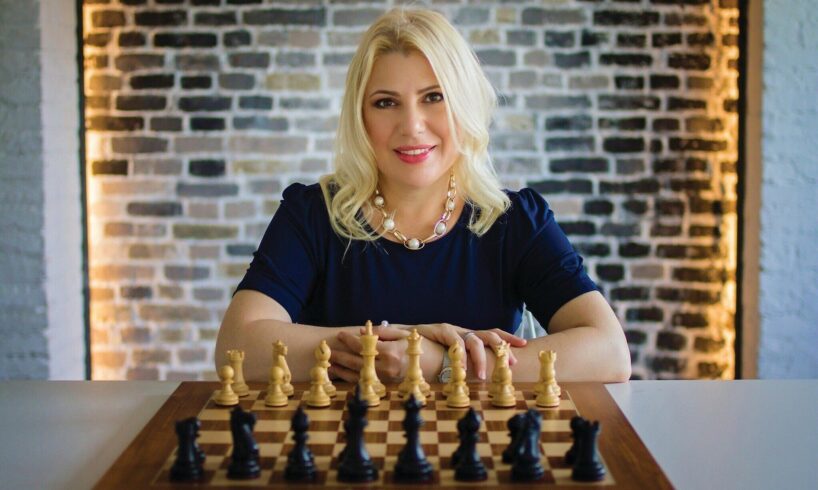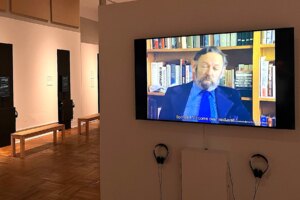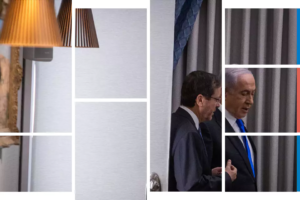
Susan Polgar would go to the ends of the earth to raise awareness of the game of chess. There was the event in Florida where she played 326 matches simultaneously, setting a world record. And there was the tournament in Carlsbad Caverns, New Mexico, highlighted by a swarm of bats and another record — the world’s lowest-elevation chess tournament.
Maybe it’s no surprise that she’s participated in such endeavors, because the Jewish Hungarian-American grandmaster has had to go to great personal lengths to play — and win — at the highest levels. It’s all told in her new memoir, published in March, “Rebel Queen: The Cold War, Misogyny, and the Making of a Grandmaster,” published by Grand Central. The book is described as “a real-life ‘Queen’s Gambit,’” a nod to the popular Netflix series.
“No matter what I faced — sexism, antisemitism and unfairness, all the difficult things you read about in the book — I managed to overcome it,” Polgar told The Times of Israel in a phone interview.
“If you’re passionate for something, willing to work hard at it, if you persevere, if you’re patient, if you follow through, nothing is impossible,” she said, calling this a “simple but powerful message.”
Born Zsuzsa Polgar in 1969, the future grandmaster grew up in Cold War Hungary, the granddaughter of Holocaust survivors. At 4 years old, she started playing chess and excelled at the game from a young age, along with her two younger sisters, under the tutelage of their father Laszlo, who sought to prove that genius could be drilled into children.
Get The Times of Israel’s Daily Edition
by email and never miss our top stories
By signing up, you agree to the terms
There was stunning success — earning a No. 1 world ranking at age 15 in 1984, making her the youngest person ever to do so — but also frustration when, in 1986, she qualified for the Men’s World Championship only to be excluded because she was a woman. Ultimately, no one could stop Polgar from establishing a glittering resume. That includes becoming, in January 1991, the first female to earn grandmaster status after satisfying the three customary requirements for male players.
“Becoming a grandmaster had been my dream for a long, long time,” she said, “pretty much since I started playing chess competitively. To be honest, I was shocked to learn no woman had ever achieved that feat prior to me.”
But according to the book, the family battled hostility from the get-go from Hungarian officials who viewed the Polgars as insubordinate to state policy when it came to chess. The bone of contention, writes Polgar, was her desire to compete in men’s tournaments, contending that the competition was stiffer due to the relative lack of female players.
The Hungarian chess establishment wanted to keep her in female-only tournaments, which she would presumably win to burnish the country’s reputation as a global chess powerhouse — a common approach in Eastern Bloc countries at the time.
In the book, Polgar wrote that “critics” made comments about her family that she felt were antisemitic dog whistles.
Susan Polgar holds her ‘best female coach in history’ award from FIDE, in Budapest, Hungary, in 2024. (Paul Truong)
Sisters Judit and Sofia went on to join their older sibling in having outstanding careers. Collectively, the trio became known as “Polgaria,” and comprised three-fourths of Hungary’s first-ever Chess Olympiad gold-medal winning women’s team in 1988.
“I’m very proud of them,” Susan Polgar said of her sisters, noting that in addition to their bond as siblings, she was also their coach.
In fact, she stated that one of the proudest days of her life was the day Judit became national champion of Hungary in 1991. When she did so, she broke Bobby Fischer’s record for youngest-ever grandmaster.
“The fight I started from age 4, all the difficulties we had to overcome … all the challenges my parents and I had to fight, it wasn’t for nothing,” Polgar said.
The Polgar sisters with chess international master Laszlo Hazai before their match against Cuba at the 1990 Chess Olympiad. (Courtesy)
The difficulties for female chess players went beyond sexism. The author recounted being assaulted when she was 12 years old by a man in his late teens during an under-21 tournament in the former Yugoslavia.
But battling the idea that chess was a men’s sport was a constant theme of her earlier playing days.
She cited multiple examples of sexism in chess during her career, and the book quotes remarks by Garry Kasparov in a Playboy interview that chess was “not for women.” When asked about her most memorable matches, Polgar listed one in the 1980s: A win against a Yugoslav grandmaster who had criticized female participation in the tournament. Ironically, one of Polgar’s most persistent opponents in Hungary was an older female player, Zsuzsa Voraci, who refused to play her on multiple occasions, according to the book.
She ended up breaking multiple records over her career. When she won world championship titles in the three major time formats for chess — Standard, Blitz and Bullet — it was a first for any player, male or female. The same went for her winning the top six chess titles in the world. In recent years, she has been inducted into the US Chess Hall of Fame and the World Chess Hall of Fame.
From left to right: Sofia, Judit, Laszlo, Klara and Susan Polgar in Budapest, Hungary, 2024. (Paul Truong)
After Polgar retired from playing chess, she excelled as a coach of two college men’s chess teams in the US: Texas Tech and Webster (Mo.) University. At Webster, located in a suburb of St. Louis, she built a record over her nine years there as the winningest American collegiate chess coach of all time. She ran the Texas Tech and Webster programs under the aegis of the Susan Polgar Institute for Chess Excellence (SPICE). She also has her own eponymous foundation. Last year the World Chess Federation saluted her as history’s greatest female chess trainer.
A cavalcade of fellow champions makes appearances in the book: Michael Tal, with whom a young Polgar played chess in Moscow. Anatoly Karpov, who teamed up with Polgar for a “Chess for Peace” event in Lindborg, Kansas, that also involved former Soviet president Mikhail Gorbachev — and a conundrum over Gorbachev’s tea. Viswanathan “Vishy” Anand, whom the author describes as a good friend. And yes, the controversial Bobby Fischer.
Chess grandmaster Susan Polgar, center, with Mikhail Gorbachev, left, and translator Pavel Palazhchenko. (Courtesy)
It was Fischer’s triumph over Boris Spassky in 1972, a Cold War battle played out on the 64 black-and-white squares of the chessboard, that heightened interest in chess worldwide. Decades later, in 1993, Polgar met Fischer clandestinely, in Yugoslavia, after he had become persona non grata to the US government. (He played Spassky again, in an exhibition in Yugoslavia; the country was under American sanctions.) She subsequently brought Fischer on a visit to Budapest, where they drove around in her Passat with two other grandmasters.
In the book, she writes that even then she was concerned about Fischer’s occasional remark “about a global Jewish conspiracy.” (Fischer was Jewish himself.) Yet, by 1994, she felt compelled to distance herself due to his antisemitic remarks. Later, she was shocked by his hateful comments about the US, Jews and Israel following the 9/11 terror attacks.
Susan Polgar’s first meeting with Bobby Fischer in 1993 in his hotel room in Nagykanizsa, Hungary. He is explaining his new invention, the digital Fischer clock. (Courtesy)
“He came out with these outrageous remarks supporting the 9/11 atrocities,” Polgar said. “It was painful to hear … My take on it is, it’s hard to judge a mentally unstable person.”
‘Rebel Queen: The Cold War, Misogyny, and the Making of a Grandmaster,’ by Susan Polgar. (Courtesy)
Israel occasionally appears within the pages of the book. Polgar, whose first husband was Israeli Jacob Shutzman, has visited the Jewish state multiple times, beginning in 1988.
“Obviously, I love Israel,” she said. “It’s a beautiful country. I just hope there will be peace one of these days.” She called the October 7, 2023, Hamas invasion of Israel a “tragedy.”
Today Polgar is married to Vietnamese American chess player Paul Truong. She credits him with coming up with the SPICE acronym, and also with calming tensions when players on one of her college teams started squabbling.
“I’m very, very thankful,” Polgar said. “I feel fortunate having him at my side, including with the book. He helped advise me, remind me of things, put things in perspective.” She called him “the love of my life.”
There is, as one might expect, a spotlight on what it’s like to play chess at an elite level. Nine-hour matches, 100-move battles, it’s all there. You’ll learn about chess openings, notation, terms — like “zugzwang,” for instance, which means “no good option,” and is used for when a player is forced into a situation in which any move they make will worsen their position.
It’s applicable to real life, too. When Polgar hosted Gorbachev and Karpov at the Chess for Peace event, there was only one cup of tea brewed, and it went to Gorbachev. Ever the gentleman, he offered Polgar a sip. If she accepted, he wouldn’t have much tea left. If she declined, she would have snubbed a Nobel laureate. Karpov quipped it was like zugzwang.
Susan Polgar at the Chess for Peace event in October 2005, at the Karpov Chess School in Lindsborg, Kansas. (Jim Turner)
Enjoy this book over a cup of tea, and perhaps while playing a game of chess yourself.
“It’s never been work for me,” Polgar said of chess. “It’s really my passion. I look at chess primarily as a constant pursuit for truth. It’s why chess is considered not just a sport, but also a science as well as art. Ultimately, even though you have an opponent, the opponent is just there to make the game more interesting.”





